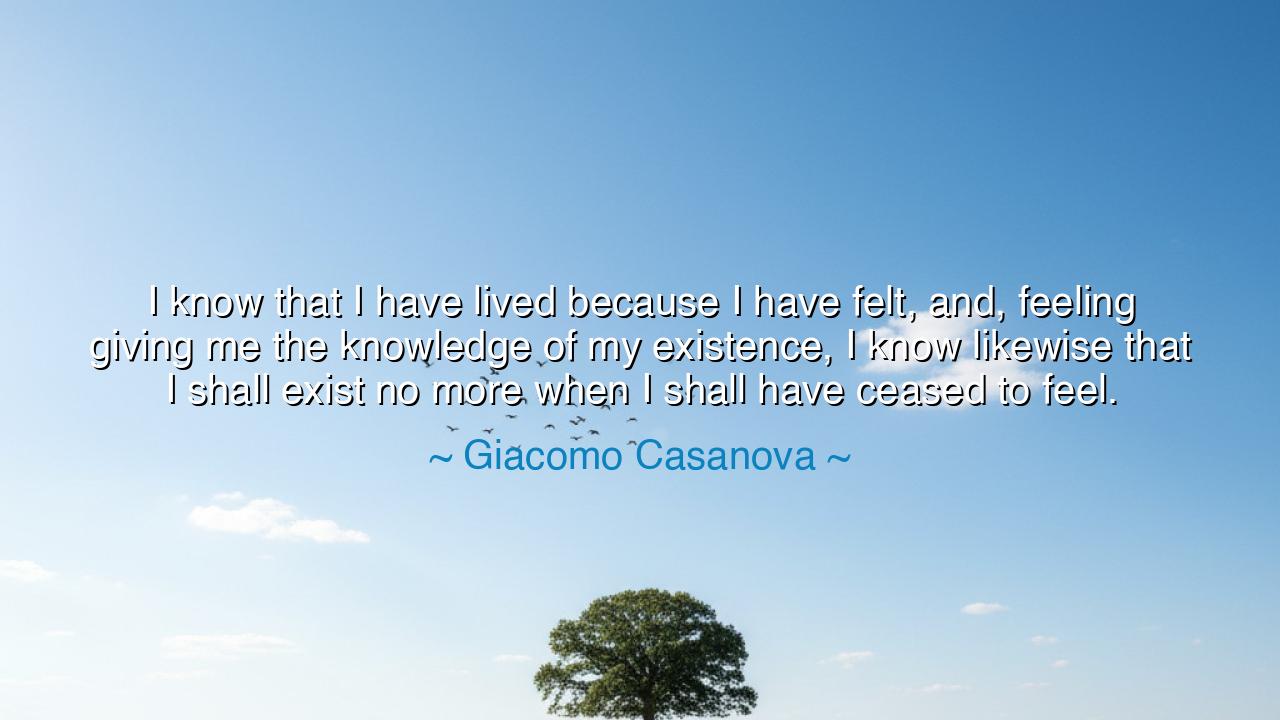
I know that I have lived because I have felt, and, feeling giving
I know that I have lived because I have felt, and, feeling giving me the knowledge of my existence, I know likewise that I shall exist no more when I shall have ceased to feel.






When Giacomo Casanova declared, “I know that I have lived because I have felt, and, feeling giving me the knowledge of my existence, I know likewise that I shall exist no more when I shall have ceased to feel,” he spoke not as a seducer, nor as a wanderer, but as a philosopher of the heart — a man who had tasted every shade of existence and found its essence in feeling. His words are not about fleeting pleasure; they are about the mystical link between emotion and being, between the pulse of sensation and the certainty of life itself. For to Casanova, existence was not measured in years or deeds, but in the depth with which one has felt — joy, sorrow, love, despair, wonder, and loss.
In his eyes, feeling was the only undeniable proof of being. One may doubt thought, as philosophers from Descartes to Hume have argued, but one cannot doubt emotion, for it moves us without permission and reminds us that we are alive. When Casanova says, “I know that I have lived because I have felt,” he is affirming that the measure of life lies not in what one has accomplished, but in what one has experienced. To feel deeply — to laugh until tears come, to love until it hurts, to suffer and still seek beauty — is to touch the raw nerve of existence. Those who live only in caution, who hide from passion and pain alike, may survive, but they do not truly live.
Casanova’s insight was born of a life that knew both ecstasy and exile. Once the darling of courts and salons, he later wandered Europe as a fugitive, a philosopher, and a man of letters. In solitude, stripped of luxury and youth, he looked back and realized that what had made his life meaningful was not his conquests or adventures, but his capacity to feel them — to be moved by art, by love, by friendship, even by disappointment. Feeling, for him, was the bridge between the soul and the world — the trembling string that vibrates and says, “I am.” Without it, even the body alive becomes a hollow shell, moving but not living.
History gives us echoes of his wisdom. Helen Keller, blind and deaf from infancy, once wrote that “the best and most beautiful things in the world cannot be seen or even touched — they must be felt with the heart.” Though she could not see the world’s colors or hear its music, she lived more vividly than most who do. Through touch, through emotion, through love, she found a richness of life that intellect alone could never provide. Like Casanova, she teaches us that feeling is the soul’s language — the divine thread connecting our inner being to the fabric of existence itself.
In Casanova’s darker reflection — “I shall exist no more when I shall have ceased to feel” — there is both acceptance and melancholy. It is the stoic acknowledgment that when sensation fades, life itself departs. Yet this is not despair, but clarity. He reminds us that the end of feeling is the end of being — and that we must, therefore, cherish every tremor of the heart while we still can. For feeling is fragile; it burns bright and fades, like the flame of a candle, but it is the light by which we know we are alive.
There is a profound lesson here for a modern age that often fears emotion, that hides behind analysis, control, and detachment. Casanova’s wisdom calls us back to vulnerability, to the courage of living with open senses. To love without fear of loss, to grieve without shame, to wonder without cynicism — these are the sacred acts that make life more than mechanical survival. To suppress feeling in the name of comfort is to silence the very heartbeat of existence.
The ancient philosophers spoke of pathos — the experience of emotion as a divine visitation, a reminder that the soul participates in something greater than itself. Casanova, in his own way, echoes this ancient truth: to feel is to partake in the eternal dance of creation, to touch both heaven and earth in a single breath. Feeling, then, is not weakness — it is the proof of our humanity, the whisper of the infinite within mortal flesh.
So, let his words be a guide for every generation: Live by feeling, not by fear. Let your heart bear witness to your existence. For the measure of your life will not be found in possessions or titles, but in the depth with which you have loved, suffered, rejoiced, and wept. When your final day comes, may you, like Casanova, look back and say, “I have lived — because I have felt.”






AAdministratorAdministrator
Welcome, honored guests. Please leave a comment, we will respond soon